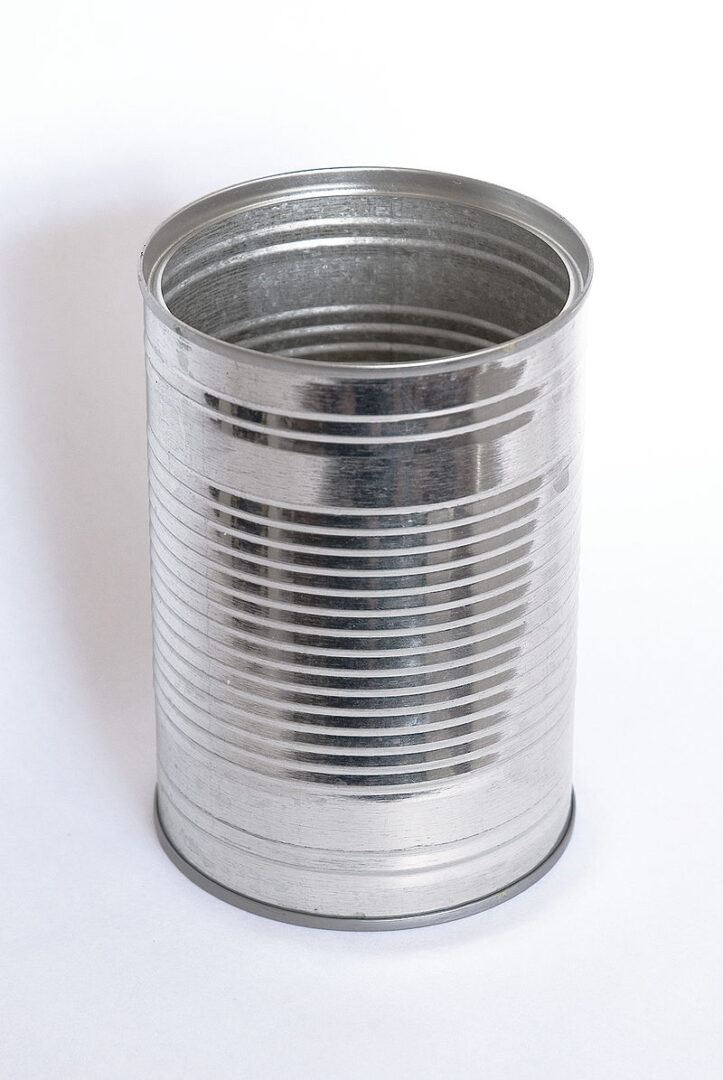By Marisol Nicholson

FROM WIKIPEDIA COMMONS
A steel can, tin can, tin (especially in British English, Australian English, Canadian English and South African English), steel packaging, or can is a container for the distribution or storage of goods, made of thin metal. Many cans require opening by cutting the “end” open; others have removable covers. They can store a broad variety of contents: food, beverages, oil, chemicals, etc. Steel cans are made of tinplate (tin-coated steel) or of tin-free steel. In some dialects, even aluminium cans are called “tin cans”.
Steel cans are highly recyclable, with around 65% of steel cans being recycled.
HISTORY
The tin canning process was conceived by the Frenchman Philippe de Girard, who had British merchant Peter Durand patent the idea in 1810. The canning concept was based on experimental food preservation work in glass containers the year before by the French inventor Nicholas Appert. Durand did not pursue food canning, but, in 1812, sold his patent to two Englishmen, Bryan Donkin and John Hall, who refined the process and product, and set up the world’s first commercial canning factory on Southwark Park Road, London. By 1813 they were producing their first tin canned goods for the Royal Navy. By 1820, tin canisters or cans were being used for gunpowder, seeds, and turpentine.
Early tin cans were sealed by soldering with a tin–lead alloy, which could lead to lead poisoning.
In 1901 in the United States, the American Can Company was founded, at the time producing 90% of the tin cans in the United States.
Canned food in tin cans was already quite popular in various countries when technological advancements in the 1920s lowered the cost of the cans even further. In 1935, the first beer in metal cans was sold; it was an instant sales success.
TODAY’S ALMANC
Question of the Day
Why do we measure daylength in hours?
The ancients divided the day in half, roughly corresponding to sunrise and sunset, with 12 hours of daylight and 12 hours of night. The length of an hour varied, depending on the time of year, until mechanical clocks were invented in the late Middle Ages.
Advice of the Day
Home Hint of the Day
Word of the Day
Puzzle of the Day
Born
- James Watt (inventor) –
- Robert E. Lee (Confederate general) –
- Edgar Allen Poe (author) –
- Paul Cézanne (painter) –
- Jean Stapleton (American actress ) –
- Patsy Rowlands (actress) –
- Janis Joplin (singer ) –
- Dolly Parton (singer) –
- Paula Deen (chef) –
- Desi Arnaz, Jr. (actor, son of Lucille Ball and Desi Arnaz) –
- Drea de Matteo (actress) –
Died
- Mother Joseph of the Sacred Heart (Canadian religious sister ) –
- William O. Douglas (Supreme Court Justice) –
- James Dickey (writer/poet) –
- Carl Perkins (musician) –
- Wilson Pickett (singer) –
- Denny Doherty (one of the founding members of the musical group The Mamas & The Papas) –
- Suzanne Pleshette (actress) –
- Stan “The Man” Musial (baseball player) –
Events
- Tin can patented–
- Explorer Charles Wilkes claimed discovery of Antarctica–
- First Brown vs. Harvard ice hockey game took place–
- Law raised salary of U.S. president to $100,000–
- U.S. Federal Communications Commission (FCC) authorized first space satellite communications link between the United States and Europe on an experimental basis.–
- The last old-style, German-made Volkswagen Beetle left the plant in Emden, Germany–
- Astronaut Roberta Bondar became the first Canadian woman to be selected for a space mission–
Weather
- Twenty-four degrees below zero F in Hartford, Connecticut–
- Temperature dropped 50 degrees in Portsmouth, New Hampshire–
- The temperature rose 43 degrees in 15 minutes at Fort Assiniboine, near Havre, Montana.–
- Lake Erie froze from bank to bank for the first time in modern history–
- Snow fell in Miami, Florida–
- A record-low barometer reading of 29.25 inches occurred due to a West Coast storm–
- Temperature dipped to -36 degrees F, New Whiteland, Indiana–
COURTESY www.almanac.com
